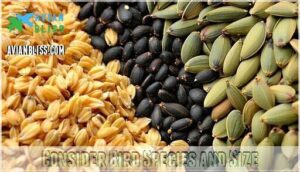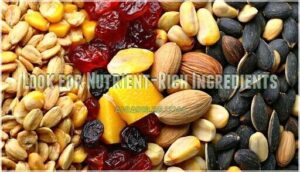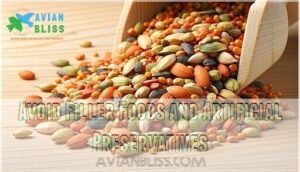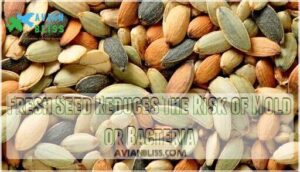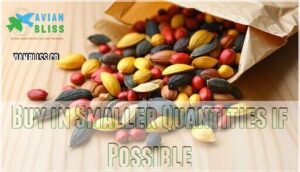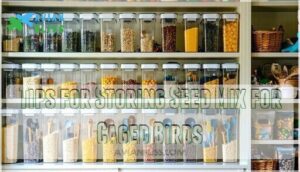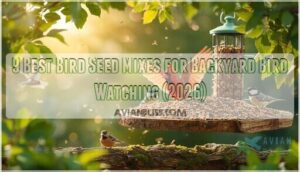This site is supported by our readers. We may earn a commission, at no cost to you, if you purchase through links.
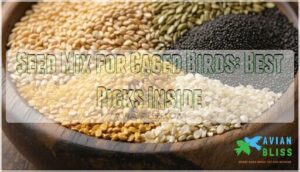
A good seed mix for caged birds should include a variety of seeds like millet, canary seed, and linseed. Avoid filler foods and artificial preservatives.
Consider your bird’s species and size when choosing a seed mix. Fresh seed is essential to prevent mold and bacteria.
Store seeds in a cool, dry place and buy in smaller quantities if possible. Now, let’s explore the top seed mixes for caged birds and learn how to create a balanced diet for your feathered friend.
Table Of Contents
- Key Takeaways
- Choosing Seed Mix for Caged Birds
- Top 7 Seed Mixes for Caged Birds
- Importance of Fresh Seed for Caged Birds
- Creating a Balanced Diet for Caged Birds
- Tips for Storing Seed Mix for Caged Birds
- Frequently Asked Questions (FAQs)
- What is the best seed mix for birds?
- Can you make your own bird seed mix?
- What can I use to bind bird seed together?
- Is it cheaper to mix your own bird seed?
- What is the best bird seed mix?
- Which seeds can be put in a bird feeder?
- Is there bird seed for Cage and aviary birds?
- Are Nyjer seeds good for birds?
- What are the best bird feeders for Cardinals?
- Are safflower seeds bad for birds?
- Conclusion
Key Takeaways
- You’ll want to choose a seed mix that’s nutritious and fresh, considering your bird’s species and size to ensure you’re providing the best possible nutrition for them.
- It’s essential to store seeds in a cool, dry place and buy in smaller quantities if possible to reduce the risk of mold and bacteria, keeping your birds healthy and happy.
- You should provide a balanced diet that includes about 10% seeds, 45% organic pellets, and 45% seasonal feeding to guarantee your birds stay healthy, and consider adding nuts and fruits for nutritional diversity.
- When selecting a seed mix, look for nutrient-rich ingredients and avoid filler foods and artificial preservatives, and consider making your own bird seed mix or using a pre-mixed option that meets your bird’s specific needs.
Choosing Seed Mix for Caged Birds
You’re choosing a seed mix for your caged birds, and this is vital.
Choosing the right seed mix is crucial for your bird’s health and happiness
You’ll want to examine their species and size.
You’ll want to look for nutrient-rich ingredients and avoid filler foods so your birds get the best possible nutrition.
Consider Bird Species and Size
When choosing seed mixes, consider your bird’s species and size.
Choose seed mixes based on your bird’s species and size for optimal nutrition
Larger birds need bigger seeds, while smaller ones prefer fine grains like parakeet seed or canary seed mix, depending on beak strength and dietary needs, varying between finch and parrot species.
Many owners purchase pre-mixed parakeet food for convenience, as it often meets the specific needs of their birds, such as dietary needs.
Look for Nutrient-Rich Ingredients
You’ll want seed mixes with varied seed types, high protein, and fat content for energy.
Look for nutrient-rich seeds, protein sources, and essential fats in your caged bird food, ensuring a balanced bird seed mix with quality ingredients.
Avoid Filler Foods and Artificial Preservatives
When selecting caged bird food, beware of filler ingredients and artificial additives.
To keep your birds healthy:
- Minimize fillers
- Avoid artificial preservatives
- Choose whole seeds for better nutrition, ensuring bird health with natural alternatives.
Premium mixes offer enhanced nutritional value with complete concepts and better nutrition.
Top 7 Seed Mixes for Caged Birds
You’re looking for the best seed mixes for your caged birds, and you want to make sure you’re giving them the nutrients they need.
Here are the top 7 seed mixes for caged birds, carefully selected to provide a balanced diet for your feathered friends.
1. Organic Small Hookbill Bird Seed Mix
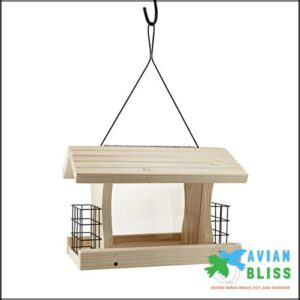
You’re considering the Organic Small Hookbill Bird Seed Mix for your small parrot.
This mix is a nutritious feast, crafted with organic oat groats, millet, flax seeds, sesame seeds, and buckwheat.
It’s free from artificial preservatives, making it suitable for small breeds like cockatiels and parakeets.
Soak the seeds in water or apple cider vinegar to enhance flavor and benefits.
This mix provides a balanced diet, but be prepared for a bit of mess.
It’s a great option for smaller parrots, offering a healthy and wholesome meal.
Best For: small parrot owners, particularly those with cockatiels, parakeets, and other small hookbill birds, who want to provide a nutritious and healthy diet for their pets.
- The mix can be messy, which may be a drawback for some owners.
- Soaking the seeds in water or apple cider vinegar is required to enhance flavor and benefits, which may be inconvenient for some.
- The product may not be suitable for larger parrot breeds or those with specific dietary needs.
- The Organic Small Hookbill Bird Seed Mix is a nutritious feast crafted with organic ingredients, making it suitable for small breeds.
- It’s free from artificial preservatives, which is beneficial for the health and well-being of small parrots.
- The mix provides a balanced diet, offering a healthy and wholesome meal for smaller parrots.
2. Wild Harvest Small Bird Food
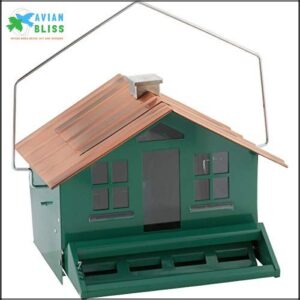
You often look for the best bird food, and Wild Harvest Small Bird Food is a great option.
It’s packed with premium seeds and veggies like millet and canola seed, perfect for small birds like canaries and finches.
This food provides essential vitamins and minerals for healthy feathers and skin.
To keep it fresh, fill your bird’s seed cup daily and store the bag in a cool, dry place.
Some consumers have reported stale batches, so check before buying.
With its nutritious ingredients, Wild Harvest Small Bird Food is a good choice for your feathered friends, offering a balanced diet for peak health, and providing everything needed for healthy feathers.
Best For: small bird owners, particularly those with parakeets, canaries, finches, and similar birds, who are looking for a nutritious and balanced diet for their pets.
- Some consumers have reported receiving stale batches
- May not be suitable for larger bird species or those with specific dietary needs
- Requires proper storage in a cool, dry place to maintain freshness and quality
- Packed with premium seeds and vegetables like millet, canola seeds, and canary grass seed
- Provides essential vitamins and minerals for healthy feathers and skin
- Offers a balanced diet for peak health, with a mix of sunflower and safflower seeds, dried peas, and more
3. ZuPreem Sensible Seed Bird Food
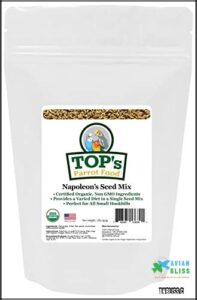
You’re looking for a smart seed mix for your caged bird. ZuPreem Sensible Seed Bird Food is a great choice, combining seeds with FruitBlend Flavor Smart Pellets.
This blend engages your bird’s foraging instincts and provides nutritional variety. You can find it online at Chewy.
Feed it up to 30% of your bird’s diet to prevent health issues. Proper storage is key to maintaining freshness.
Some birds may be picky, but many enjoy this blend. With its balanced mix of seeds and pellets, ZuPreem Sensible Seed is a sensible option for your feathered friend. It’s a great way to keep them healthy and happy.
Best For: small to large bird owners looking for a balanced and nutritious seed mix that combines seeds with FruitBlend Flavor Smart Pellets to provide a varied diet for their pets.
- Provides a balanced mix of seeds and pellets to engage birds’ foraging instincts and offer nutritional variety
- Can be found online at Chewy for convenient purchasing and delivery
- Supports overall bird health and wellbeing by providing essential vitamins and minerals
- May not be suitable for birds with specific dietary needs or restrictions, such as those requiring a corn and soy-free diet
- Some birds may be picky and not enjoy the blend of seeds and pellets
- Requires proper storage to maintain freshness and may become stale if not stored correctly
4. Parakeet Canary Finch Bird Seed Blend
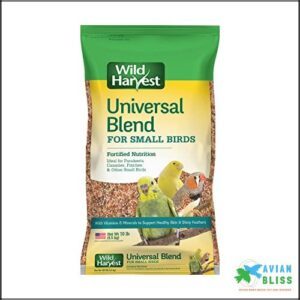
You’ll love the Wild Harvest Parakeet Canary Finch Bird Seed Blend, specially designed for small birds.
This 10-pound bag contains red and white millet, canary grass seed, and a hint of orange essence.
It’s a nutrient-rich blend with vitamins and minerals for optimum health.
Store it in a cool, dry place to keep it fresh, and your birds will thrive on this tasty mix, and you’ll appreciate the resealable bag.
Best For: small bird owners, particularly those with parakeets, canaries, and finches, who want a nutrient-rich blend for their pets.
- The blend contains premium seeds and vegetables like millet, canary grass seed, and has a hint of orange essence for a tasty mix.
- It is a nutrient-rich blend with vitamins and minerals for optimum health, supporting healthy skin and shiny feathers in small birds.
- The resealable bag helps to keep the seed fresh, and the product is available in a 10-pound pack, which is convenient for daily feeding.
- Some users note a lack of seed variety in the blend, which may not provide a balanced diet for some birds.
- The blend can be dusty, which may not be suitable for birds with respiratory issues.
- Some birds may be selective eaters, and the blend may attract outdoor birds and squirrels, which can be a problem for some users.
5. Bird Food Daily Blend Diet 2 Pound Orange
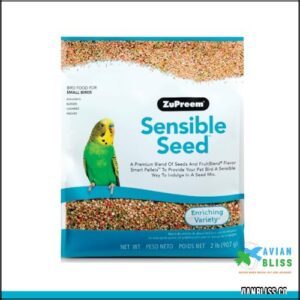
You’re looking for a nutritious seed mix for your cockatiels or lovebirds.
The Daily Blend Diet 2 Pound Orange is a great option, featuring millet, sunflower seeds, and safflower seeds with a zesty orange essence.
This mix is packed in a barrier bag for freshness and is ideal for picky eaters.
Store it in a cool, dry place and consider mixing it with pellets for added nutrients.
This blend provides a balanced diet for your birds, keeping them happy and healthy.
It’s a great value, especially when mixed with pellets.
Best For: small bird species, including parakeets, canaries, and finches, that require a balanced and nutritious diet.
- Packaging issues reported due to weight during shipping
- Artificial coloring concerns discussed in bird forums
- Some birds may be initially resistant to the new food
- Provides a balanced diet with a mix of seeds, grains, and dried fruits
- Encourages foraging instincts and offers enriching variety in diet
- Long-lasting and cost-effective when purchased in bulk
6. Woodlink Bird Feeder with Suet Cages
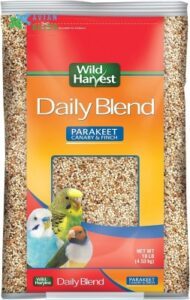
You’re searching for a sturdy feeder, and the Woodlink bird feeder is a great option.
This hopper-style feeder holds five pounds of seed and two suet cakes. It features clear windows and a hinged roof for easy cleaning.
While well-made, some users report flimsy plastic sheets and potential clogging. It attracts various birds, but be aware that squirrels and doves might also visit.
Consider adding suet cakes to specifically attract woodpeckers and other birds. The feeder has its limitations, so weigh the pros and cons before making a decision, ensuring it meets your bird-feeding needs.
Best For: bird enthusiasts who want a sturdy feeder that can hold a significant amount of seed and suet cakes, attracting various bird species to their yard.
- Some users report that the plastic sheets can be flimsy and prone to clogging.
- Squirrels and doves may also visit the feeder, which can be a nuisance for some users.
- The feeder has its limitations, and users need to weigh the pros and cons before making a decision to ensure it meets their bird-feeding needs.
- The feeder is well-made and has a hopper-style design that holds five pounds of seed and two suet cakes.
- It features clear windows and a hinged roof for easy cleaning and filling.
- The feeder attracts various birds, including woodpeckers and other species that enjoy suet cakes.
7. Squirrel Proof Bird Feeder
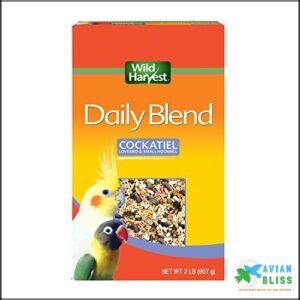
Because squirrels can be a nuisance, consider a squirrel-proof bird feeder with a weight-activated perch.
This guarantees seeds are reserved for birds, not squirrels. Made from durable metal, it’s rust-resistant and can withstand elements and wildlife.
You can hang or pole mount it for versatile placement. For a balanced diet, pair it with a small bird food mix containing black oil sunflower seeds and white millet.
Remove the feeder overnight to prevent raccoons from accessing it. This feeder is a great option to keep squirrels out and provide a healthy diet for your birds.
Best For: bird owners who want to keep squirrels out of their bird feeders and provide a healthy diet for their birds.
- The feeder needs to be removed overnight to prevent raccoons from accessing it, which can be inconvenient for some users.
- No feeder is 100% squirrel-proof, so there is still a chance that squirrels could find a way to access the seeds.
- The feeder may not be suitable for all types of birds or bird food, so users need to ensure that it is compatible with their specific needs.
- The feeder is made from durable metal and is rust-resistant, making it able to withstand elements and wildlife.
- It can be hung or pole mounted for versatile placement, allowing users to place it in a variety of locations.
- The weight-activated perch guarantees that seeds are reserved for birds, not squirrels, ensuring that the intended animals are the only ones accessing the food.
Importance of Fresh Seed for Caged Birds
You want to give your caged birds the best, and that starts with fresh seed.
By storing seeds in a cool, dry place and buying in smaller quantities, you can reduce the risk of mold and bacteria, keeping your birds healthy and happy.
Fresh Seed Reduces The Risk of Mold or Bacteria
You prioritize fresh seed to prevent mold and bacteria, ensuring caged birds’ health.
Fresh seed is essential for a bird seed mix, as it reduces the risk of mold and bacteria, promoting a longer seed lifespan through proper storage methods and regular visual inspection.
This is important because dirty feeders pose risks, and using proper storage methods can help mitigate these issues, ultimately supporting the health and wellbeing of the birds by providing high-quality feed.
Store Seeds in a Cool, Dry Place
You store bird seed mix in a cool, dry place for humidity control and pest prevention.
Ideal temperature and humidity control maintain freshness. Use airtight containers to prevent mold and keep caged birds healthy.
Consider using an airtight storage option to best preserve your birdseed. Proper bird food storage guarantees a longer shelf life for your bird seed mix.
Buy in Smaller Quantities if Possible
You’ll reduce waste and prevent spoilage by buying pet bird seed in smaller quantities, maintaining freshness and controlling your budget.
This approach helps assess consumption and guarantees your caged birds get the best seed mix, keeping them healthy and happy with fresh bird food storage.
Creating a Balanced Diet for Caged Birds
You’re creating a balanced diet for your caged birds, and to maintain their health, offer a variety of seeds and nuts.
You should provide fresh water and a balanced diet that includes about 10% seeds, 45% organic pellets, and 45% seasonal feeding to guarantee your birds stay healthy.
Offer a Variety of Seeds and Nuts
To keep your caged birds healthy, offer a variety of seeds and nuts for nutritional diversity.
Include a seed mix with sunflower seeds, safflower seeds, and Nyjer seeds.
Add nuts like shelled peanuts for protein.
This seed variety provides essential nutrients, mimicking wild diets, and supports supplementation needs for a balanced bird seed mix recipe.
Provide Fresh Water and a Balanced Diet
For caged birds, you provide fresh water and a balanced diet.
Offer a variety of seeds, fruits, and veggies, and supplement seeds sparingly to avoid overnutrition, ensuring a balanced diet with protein sources for ideal bird nutrition, including complete concepts such as proper nutrition and care.
Tips for Storing Seed Mix for Caged Birds
You’ll want to store your seed mix in a cool, dry place to keep it fresh.
By using airtight containers and labeling them clearly, you can guarantee your bird’s seed mix stays safe and healthy for them to eat.
Use Airtight Containers and Label Clearly
When storing seed mix, you’ll want to use airtight containers made from durable materials to prevent pest invasion and maintain freshness.
Clear labeling methods, including date labeling, help you quickly identify contents, ensuring your caged birds receive the best bird seed and bird food containers for their needs.
Proper storage prevents spoilage, and you can find suitable storage options online for the best storage options.
Keep Storage Area Clean and Dry
To maintain a clean storage area, follow these steps:
- Choose airtight containers
- Select a dry location
- Control humidity to prevent mold prevention and guarantee pest control for your bird seed mix, keeping your caged birds safe.
Regularly Inspect for Mold or Pests
Check your birdseed supply every couple of weeks for mold or pests.
Look for unusual smells, holes, or creepy-crawlies to guarantee safe bird food and prevent mold identification issues, promoting pest prevention and a longer seed lifespan for your caged birds.
Using airtight containers will also help maintain freshness.
Frequently Asked Questions (FAQs)
What is the best seed mix for birds?
You’ll find the best seed mix by considering your bird’s species, size, and dietary needs, opting for nutrient-rich ingredients like black oil sunflower seeds for a balanced diet.
Can you make your own bird seed mix?
You can create your own bird seed mix by combining various seeds, nuts, and grains, but guarantee a balanced diet with proper nutrition for your birds’ specific needs.
What can I use to bind bird seed together?
In the case of binding bird seed, you’re on the right track, and a little honey or corn syrup can go a long way to hold it together nicely.
Is it cheaper to mix your own bird seed?
You can mix your own bird seed, but it may not be cheaper due to the cost of individual ingredients and potential waste.
What is the best bird seed mix?
You’ll want a balanced mix with nutrient-rich ingredients like black oil sunflower seeds, suitable for your bird’s species and size, ensuring a healthy and varied diet.
Which seeds can be put in a bird feeder?
You can put black oil sunflower seeds, safflower seeds, and nyjer seeds in a bird feeder for a nutritious and attractive treat for various bird species.
Is there bird seed for Cage and aviary birds?
You’ll find various bird seeds formulated for cage and aviary birds, offering balanced diets and nutritional supplements to support their health and well-being, with options like ZuPreem and Wild Harvest.
Are Nyjer seeds good for birds?
Imagine a bird’s delight, you’ll discover Nyjer seeds are a great energy source, rich in calories and oil, perfect for finches and small birds, offering a nutritious treat.
What are the best bird feeders for Cardinals?
You’ll need feeders with perches, trays, and weight-activated ports to attract Cardinals, keeping larger birds away, ensuring a delightful bird-watching experience.
Are safflower seeds bad for birds?
You’ll be relieved to know safflower seeds aren’t bad for birds, they’re actually a great alternative to sunflower seeds, offering similar nutrition without the attractiveness to squirrels and other pests.
Conclusion
What’s the best way to keep your feathered friend happy?
You’re now equipped to choose a great seed mix for caged birds, considering their species and size.
Remember, a good seed mix for caged birds should be nutritious and fresh, so select a high-quality seed mix for caged birds that meets their needs, providing a great choice for them.

